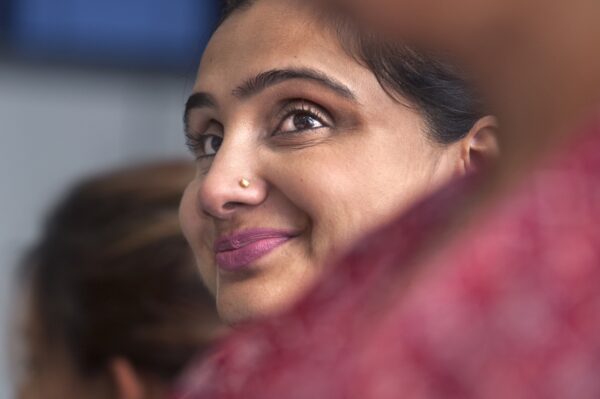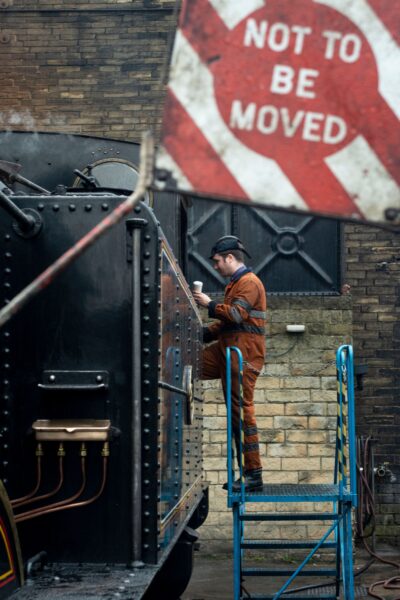Womenzone
You're invited in to womenzone, a place that has become a second home to many women.

Published: July 3, 2025
Author: Tim Smith
Meet The People of Bradford in our digital series, created in collaboration with renowned documentary photographer Tim Smith.
Tim Smith’s photographs and creative work capture the social and cultural experiences of his subjects. In this unique series, we’re bringing together the lives and stories of real Bradford people with Tim’s captivating images.
These are the wonderful women of Womenzone – in their own words.
Womenzone is a community centre based in Bradford, supporting and encouraging women for over 20 years!








Rubina Khalid
These women, they call this their second home. The term most people use about Womenzone is that it’s like a family. So I think that speaks for itself, that people are well looked after, well taken care of, and well listened to.

We try to do things for them, or if we can’t do these things, we signpost them. Over the years we have developed this relationship of understanding, trust and communication, and I think that’s the major key to the successful programs of Womenzone. These women who use the centre, they trust us. They treat this like a family.
All of our services are developed in consultation with the women we support. Many of them first come to use the services, and then go on to volunteer with us. We’ve trained over a 100 volunteer champions who now help us to deliver these services. You know, typically, women first access the service for themselves, then recommend it to family and friends, and eventually start volunteering. Over 50% of our current staff started as volunteers. Once they developed their skills, they were offered jobs.
Most of the women who use the centre are South Asian, from the 1st generation to the present generation. One thing which bridges the gap is cultural activities. Everyone has got a special bond with their culture and we always want to stay connected with our roots, culture, art and music. So, we are delivering activities and programs around art and culture very successfully.
The very first one, Shalwar Kameez, we talked about fashion, the clothing women brought back in the fifties and sixties, and where is that now? Then after that we run a successful project, Loving Grannies’ Music. We didn’t want the grannies, who are into their eighties, to have their music and poetry to go with them. We wanted them to leave that back for future generations: songs they were singing for weddings, birthdays, seasonal festivals like harvesting crops and all that.

I think that when you put on a performance, an exhibition, or engage in arts and culture, you’re also creating a space where people from different cultures or generations can come together.
A lot of people will say, “Oh, I can’t go to the church” or “I can’t go to the mosque” or “I can’t go here” or “I can’t go there”. But food, music and all that stuff, brings people together because they don’t have any boundaries, they don’t have any language. Only a language of love, which all we all understand.

Sadia Sajid
We’re looking at health and well-being and using that as a vehicle to empower women, because if a woman is feeling low, down, depressed, and not got a lot of confidence, then she needs to build and work on that first before she goes out. We’ve seen some beautiful journeys of people who have joined the gym and then become volunteers at Wowenzone, supported the elderly groups, made cups of coffees and teas, and then they’ve worked with all the projects that have come to the centre. Before you know it, they become sessional workers or they’ve got paid employment.

It’s about empowering women, but it’s individual to every woman. For some women, it might be empowering them to gain employment, or it might be to go into education training, for others, it might be as simple as learning the language.
We’ve got women that have been here 40, 50 years and haven’t left the house much, and they’ve never got the grasp of the English language. As they’ve got older, they’ve got more free time, so they come here, they learn English, and they’re just more confident in themselves, and it’s nice that they’re able to go to see the GP without having to ask somebody to go along with them. It gives a lot of independence to the women that we work with.

We’re based in Bradford Moor, in Bradford East. We’ve got a big South Asian community. A lot of the service users that attend women’s zone are from, Pakistani, Bangladeshi backgrounds and it’s predominantly, Muslim women that come to the centre. We are open to all faiths and all ethnicities, the local area is made up of a lot of the communities that come to the centre.

We had the Loving Grannies Music project, which was looking at folk music, where it came from in places like India and Pakistan, how it’s travelled across the seas and how it’s come here. We still have the traditions at weddings of people playing the dholki (hand drum), hitting it with a metal spoon and singing traditional songs. That is kind of getting lost now with the generations. For example, if you give me a dholki, I can play it. I can sing the songs, and I know the words, and I understand what they mean. But if you bring my children in, they won’t have a clue what those words mean or what those songs are about, so it’s just trying to keep bits of heritage in life. So we’ve we’ve created a book, which we can share with people, and it’s lovely to have it.

The Bradford Aunties project is more intergenerational. So it’s looking at how young people can learn from the aunties, how aunties can learn from the young people. And there was a lot of misconceptions about what older women thought about young people, what the young people thought about aunties, and it was amazing, some of those misconceptions are cleared up. And people have wanted to continue it, so we’re planning to do a monthly program. We don’t know what that’s going to entail. It will most likely come from the community. So it might be 1 month they do cooking, 1 month look at sewing, 1 month they just have a letter and have a chat. So that is something that we’re working on at the minute.
I feel like this is a place where people can be seen. Often, women are doing their duty. They’re looking after everybody else, and they put everyone’s needs first. And this is a place that they come where their needs are met, where they are put first, their voices are heard. And I think that’s a really nice feeling to have for the women, that this is somewhere where they’re seen for who they are rather than just what they could do for others.
